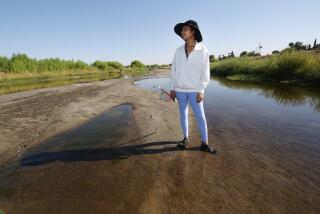U.S. Offers Help to Salmon Industry
SACRAMENTO â The Bush administration took the first step Thursday toward providing disaster relief to West Coast fishermen facing their worst season on record because of plummeting salmon runs on the drought-plagued Klamath River.
U.S. Commerce Secretary Carlos M. Gutierrez announced that he was declaring a fishery resource disaster for commercial salmon fishermen in California and Oregon.
Gov. Arnold Schwarzenegger and West Coast lawmakers, including U.S. Sens. Dianne Feinstein and Barbara Boxer, have been pushing Gutierrez and the Bush administration for weeks to provide financial assistance to strapped fishermen.
Gutierrezâs announcement, which came after a telephone conference call requested by Feinstein, opens the door for limited financial assistance to fishermen. They would be able to apply for federal small-business, low-interest loans, but lawmakers said that wasnât nearly good enough.
âThis is a very important first step, but weâre not nearly where we need to be,â said California Rep. Mike Thompson (D-St. Helena), who last week waged a regulatory battle on the House floor in an attempt to win financial assistance for the fishermen.
Thompson said they didnât have the income to repay loans even if they could qualify. He and other federal lawmakers from Oregon and California have been trying to push through $81 million in disaster assistance and compel the Bush administration to produce a $45-million Klamath salmon recovery plan.
Gutierrez said his announcement âis not the end of the process, but the beginning.â
The Commerce secretary, whose department oversees the National Marine Fisheries Service, will send an evaluation team Monday to begin the process leading to a determination of a commercial fishery failure -- a more comprehensive declaration that could yield direct financial aid to the beleaguered industry.
Gutierrez also asked that Schwarzenegger and Oregon Gov. Ted Kulongoski consider using $6.5 million in federal salmon recovery funds funneled to their states this year to help fishermen.
Federal regulators said a combination of a weekly catch limit and a shortened season along a 700-mile stretch of Oregon and Northern California was necessary to ensure that enough chinook salmon return to reproduce this fall in the struggling Klamath River, once among the Westâs mightiest spawning grounds but now its most imperiled.
In California, the year has gotten off to an even slower start than expected. With fishing allowed only in May and the coastal salmon fleets banned from the water during the usually robust months of June and July, the catch has been a paltry 9,883 Chinook -- just 4% of normal by the start of July.
The Klamath, which emerges from the snowmelt of Oregon to empty into the sea north of Eureka, Calif., has endured five years of drought and a water war in 2001 characterized as a fight between farming and fish.
Although the Bush administration blames the riverâs problems on drought, fishermen say federal water policy is largely to blame.
In 2002, the federal government began diverting more water to agriculture.
Uncounted thousands of juvenile salmon were killed by a parasite blamed on lower river flows, and that fall more than 70,000 returning adult chinook succumbed to disease.
More to Read
Get the L.A. Times Politics newsletter
Deeply reported insights into legislation, politics and policy from Sacramento, Washington and beyond. In your inbox three times per week.
You may occasionally receive promotional content from the Los Angeles Times.










